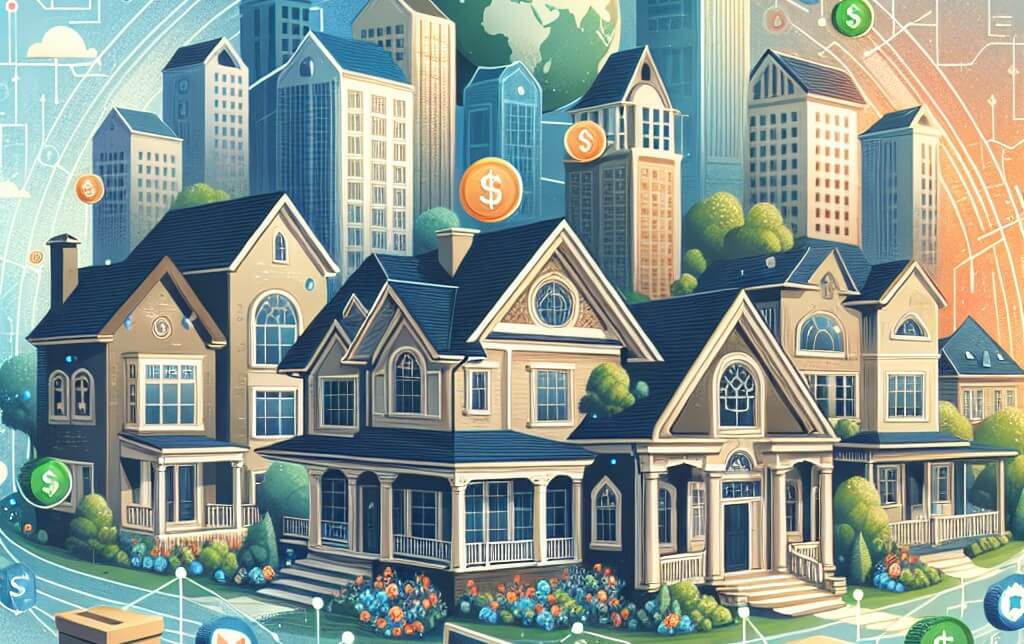
Transforming Real Estate with Blockchain Technology
Blockchain technology has the potential to revolutionize the real estate industry by providing a secure and transparent way to record transactions and ownership information. Through the use of blockchain, real estate processes such as property sales, leasing, and management can be streamlined, reducing the need for intermediaries and ensuring greater efficiency. Additionally, blockchain can increase trust among parties by creating an immutable and decentralized ledger that tracks the history of property ownership and transactions. This innovation has the power to transform the way real estate transactions are conducted, making them more secure, cost-effective, and accessible to a wider range of participants.
Introduction
The introduction of blockchain technology in the real estate industry has revolutionized the way transactions are conducted, bringing transparency, security, and efficiency to the process. Blockchain, a decentralized and immutable digital ledger, allows for the secure recording of property ownership, transactions, and contracts. This innovation has the potential to streamline the buying and selling of properties, reduce fraud, and eliminate the need for intermediaries. As blockchain continues to gain traction in the real estate sector, it is poised to transform the industry by creating a more trustworthy and efficient ecosystem for all stakeholders involved.
Benefits of Blockchain in Real Estate
Blockchain technology offers several benefits in the real estate industry. One key advantage is increased transparency and security in property transactions. By utilizing blockchain, all transactions are recorded on a secure and immutable ledger, reducing the risk of fraud and ensuring the integrity of the data. Additionally, blockchain can streamline the process of property transactions by automating tasks such as contract execution, payment processing, and title transfers. This not only reduces the time and cost associated with transactions but also enhances the efficiency of the real estate market. Furthermore, blockchain can enable fractional ownership of properties, allowing investors to diversify their portfolios with smaller investments in real estate assets. Overall, the integration of blockchain technology in real estate has the potential to revolutionize the industry by promoting trust, efficiency, and accessibility for all stakeholders involved.
Use Cases of Blockchain in Real Estate
Blockchain technology has the potential to revolutionize the real estate industry by enhancing transparency, security, and efficiency in property transactions. One significant use case of blockchain in real estate is the digitization of property titles. By storing title deeds on a blockchain, the ownership of properties can be securely verified and transferred without the need for intermediaries, reducing the risk of fraud and streamlining the transaction process. Additionally, blockchain can facilitate smart contracts, enabling automated and self-executing agreements between buyers and sellers, landlords and tenants, or other parties involved in real estate transactions. This not only reduces the potential for disputes but also ensures that contractual terms are enforced accurately and transparently. Overall, the integration of blockchain technology in real estate has the potential to simplify processes, reduce costs, and increase trust among all stakeholders in the industry.
Challenges and Limitations
In the realm of blockchain technology applied to the real estate industry, challenges and limitations are prevalent. One significant obstacle is the issue of scalability, as the current blockchain infrastructure may not be able to handle the vast amount of transactions and data involved in real estate transactions on a large scale. Additionally, the regulatory environment surrounding real estate transactions can pose challenges, as there are complex legal requirements that must be met when utilizing blockchain technology in this sector. Moreover, the integration of blockchain into existing real estate systems and processes may require significant time and resources, further complicating its widespread adoption. Despite these challenges, the potential benefits of blockchain in revolutionizing the real estate industry are substantial, making it a worthwhile endeavor to address and overcome these limitations for future implementation.
Case Studies and Findings
Case studies and findings in the realm of blockchain and real estate have shown promising results in revolutionizing the traditional processes within the industry. By leveraging blockchain technology, transactions in real estate can be conducted securely, transparently, and efficiently. Case studies have demonstrated that blockchain can streamline property transactions, reduce fraud, and increase trust among stakeholders. Furthermore, findings indicate that blockchain can provide a tamper-proof record of ownership, improve the speed of transactions, and lower costs associated with intermediaries. These insights highlight the potential of blockchain to transform the real estate sector by enhancing transparency, security, and overall efficiency.
Future Outlook
The future outlook for blockchain technology in the real estate industry appears promising, with the potential to revolutionize the way transactions are conducted, recorded, and verified. By leveraging blockchain's decentralized and secure nature, real estate transactions can become more transparent, efficient, and cost-effective. Smart contracts can automate processes such as property title transfers, lease agreements, and escrow services, reducing the need for intermediaries and minimizing the risk of fraud. Additionally, blockchain can enable fractional ownership of properties, making real estate investments more accessible to a wider range of investors. As the technology continues to mature and gain widespread adoption, it is likely to reshape the traditional real estate market and create new opportunities for innovation and growth.
Conclusion
In conclusion, the integration of blockchain technology in the real estate industry presents a promising avenue for enhancing transparency, security, and efficiency in property transactions. By utilizing blockchain for tasks such as smart contracts, digital property records, and tokenization of real estate assets, stakeholders within the industry can streamline processes, reduce fraud, and improve trust among participants. As blockchain continues to mature and gain widespread adoption, its potential to revolutionize the way real estate transactions are conducted is becoming increasingly evident. Embracing this technology can pave the way for a more robust and resilient real estate market that is better equipped to meet the evolving needs of buyers, sellers, and investors.








